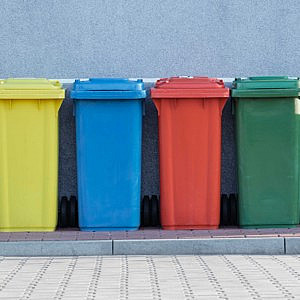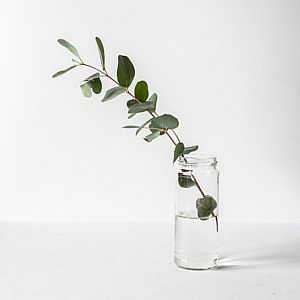7 steps to create your own home recycling system
Reducing the use of plastics, building sustainable houses, repurposing discarded materials - the media is full of information about the problems consumerism can cause and articles about how much we can do to help the situation. Some of the facts are truly mind-blowing'¦ For example, did you know that the energy saved from recycling just one glass bottle is enough to power a light bulb for four hours? When we recycle we are decreasing the need for landfills and incinerators, therefore reducing ground and air pollution as well as land usage. In this post, Filipa do Carmo of Khora Space Sorted explains how to organise your own recycling system at home. If you want to lead a more sustainable lifestyle, start with the simple act of recycling. Having a simple system in place is a great way to guarantee your commitment. And by simple, I mean, a system that works specifically for you (and your family or co-workers). Here are some steps to make it happen:1. Do your research
Start by checking online for recycling options in your community. You can easily find this information on your local council's website. As you know, the rules vary enormously depending on location, so do check. This information will serve as a guide to help you with the steps below and provide you with a quick reference guide to check. This is especially useful if you need to separate the different types of waste.2. Know your trash
If you know the type of waste you create and how often it's collected it will be easier to decide which bins to get, if you need this extra storage, and where to place your bins. Take time to observe the quantity and type of waste you produce before you decide what to get.
3. Make it easy
This is a really important step. If it doesn't make sense, or is dysfunctional, we will be less likely to commit. Placing the recycling bin next to the non-recycling one will increase the chances of recycling more. When this is not possible in the space we have available, try to find the nearest location. Another option is to have different containers which let you separate as you dispose, to avoid having to sort everything twice.4. Compost
The benefits of composting are endless; it makes total sense to use organic matter to nourish our soil. Some councils offer compost bins and bags which they collect on specific days. Otherwise, you can donate it to local gardeners or allotment holders, or use it for your own garden, if you are lucky to have one.5. Bathroom recycling
Whilst most households are getting better at sorting their kitchen waste, the same rarely happens in the bathroom. A good solution here is to have two bins in the bathroom too and use one to collect empty plastic bottles and paper which can be recycled. If you want to push it a bit further, start thinking about using plastic-free alternatives - such as soap, solid shampoo - or making your own face cream. There are a lot of options out there.
6. Battery recycling
Set aside a small box or can in which you can place used batteries and other small electrics. These are highly toxic and need to be recycling in specialised containers. Most supermarkets now have bins for batteries, so keeping your battery box close to your shopping bags will remind you to take them with you when you go shopping.7. Donation box
Another good idea is to have a donation box into which you can place clothes, electronics and other items you no longer need, but which could be useful to others. It's always better to keep everything in one place, instead of different piles around your home. In this way, whenever you know you are going to pass by your local charity shop, you can take everything with you in one go. Or perhaps contact a charity to book a collection. In our recent blog post "What to do with your unwanted stuff" there are some further suggestions of how to recycle the items that you are decluttering from your home.If Filipa's post has inspired you to declutter and get organised, you can find your local professional organiser here.
